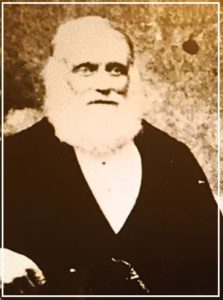Caleb Baldwin was born September 2, 1791, son of Philemon and Esther Baldwin, in Nobleltown, Orange County, New York.
As a young man he served as a second lieutenant in Captain Clark Parker’s Company of the Ohio Militia from August 22, 1812 to March 3 1813. While there isn’t much detail available as to Caleb’s service during the war, the events of his life demonstrate he was not only a Patriot, but a man of courage, faith, and perseverance.
After the war he moved to Cleveland, Ohio, where he met Nancy Kingsbury, daughter of James Kingsbury of Cuyahoga County, Ohio. The two married on December 7, 1814. They had nine children: seven daughters and two sons.
daughter of James Kingsbury of Cuyahoga County, Ohio. The two married on December 7, 1814. They had nine children: seven daughters and two sons.
Caleb and Nancy heard the restored gospel that was preached to them from Oliver Cowdery and his missionary companions, who were from the newly formed Church of Jesus Christ of Latter-day Saint. They were baptized by Parley P. Pratt and confirmed members of the Church by Oliver Cowdery on November 14, 1830.
They remained in Ohio for a time but eventually moved to Jackson County, Missouri, where they built a homestead in the Blue River settlement west of the Big Blue River. By virtue of their location, Caleb Baldwin became involved in the Battle above the Blue. On November 4, 1833, he briefly commanded a company with David Whitmer and participated in the fighting.
From 1835 to 1836 he served a mission in Illinois, writing to the Church publication The Messenger and Advocate about his successes. In one such letter, he and Levi Jackman reported that they had baptized 19 and established a congregation of 20 people in Clear Creek, Union County.
After his mission, he settled his family in Far West. It was here that he was arrested by General Clark and taken to Richmond, where he was held with many other men without any charges being named against him.
According to an affidavit Baldwin made in 1843, he was allowed an interview with Judge Austin A. King in November 1838 before the Richmond court of inquiry took place. In that interview he asked King for a “fair trial” but was told “there was no law for the Mormons.” He then asked how he was supposed to help his family, explaining that they were made up primarily of women and were helpless and homeless. King told him that “if he would renounce his religion and forsake [Joseph] Smith he would be released and protected.” Baldwin refused, and after the hearing in Richmond, he was held on the charge of treason-probably because of testimony alleging he had claimed the Mormons planned to take over Davies and Livingstone Counties and then the whole state.
He was sent to Liberty Jail with Joseph Smith and the other four prisoners, and he spent four months incarcerated there. After the prisoners were discovered in their attempt to escape by boring a hole through the wall of the jail, one of the officials at the jail, Samuel Tillery, was going to chain them to the floor. Caleb declared, “Judge Tillery, if you put these chains on me, I will kill you so help me God.” Tillery walked away without putting chains on any of the prisoners. When the men escaped their guard, Caleb settled with his family in Nauvoo.
Caleb was a friend and supporter of the Prophet Joseph Smith. One immigrant to Nauvoo tells of finding the Prophet, upon her arrival, preaching to a small group of people in a field. Joseph was standing on a keg behind Caleb Baldwin, using Caleb’s shoulders as a desk.
The Baldwin’s lived in Nauvoo until after the Martyrdom of Joseph and Hyrum Smith. While there, Caleb and his wife both received their endowments in the Nauvoo Temple and were sealed together.
In 1848 Caleb immigrated to the Salt Lake Valley with the Heber C. Kimball Company, arriving on September 24, 1848. He died of “Chill Fever” less that a year later on June 11, 1849, at the age of 57.
Grave Marking Ceremony Program May 25, 2019

